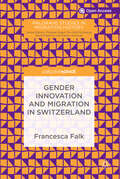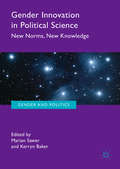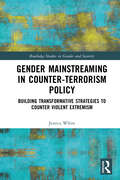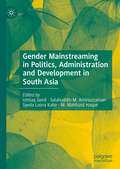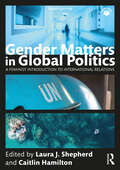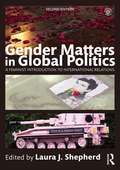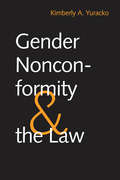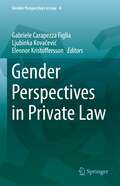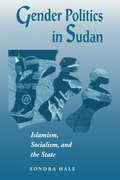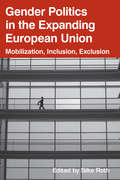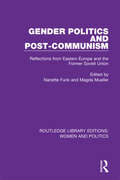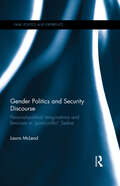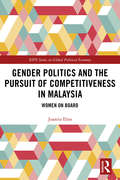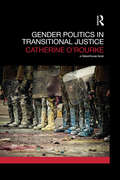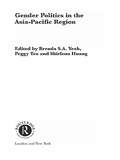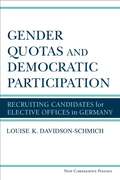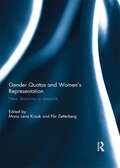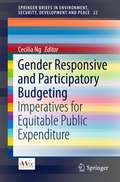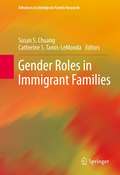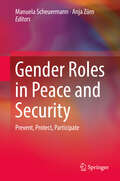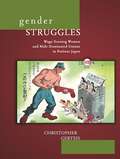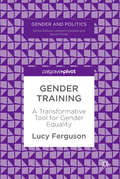- Table View
- List View
Gender Innovation and Migration in Switzerland (Palgrave Studies in Migration History)
by Francesca FalkThis open access book analyses migration and its relation to socio-political transformation in Switzerland. It addresses how migration has made new forms of life possible and shows how this process generated gender innovation in different fields: the changing division of work, the establishment of a nursery infrastructure, access to higher education for women, and the struggle for female suffrage. Seeing society through the lens of migration alters the perspective from which our past and thus our present is told—and our future imagined.
Gender Innovation in Political Science: New Norms, New Knowledge (Gender and Politics)
by Marian Sawer Kerryn BakerIn this book, leading gender scholars survey the contribution of feminist scholarship to new norms and knowledge in diverse areas of political science and related political practice. They provide new evidence of the breadth of this contribution and its policy impact. Rather than offering another account of the problem of gender inequality in the discipline, the book focuses on the positive contribution of gender innovation. It highlights in a systematic and in-depth way how gender innovation has contributed to sharpening the conceptual tools available in different subfields, including international relations and public policy. At the same time, the authors show the limits of impact in core areas of an increasingly pluralised discipline. This volume will appeal to scholars and students of political science and international relations.
Gender Mainstreaming in Counter-Terrorism Policy: Building Transformative Strategies to Counter Violent Extremism (Routledge Studies in Gender and Security)
by Jessica WhiteThis book analyzes policy and programming challenges for gender mainstreaming in counter-terrorism, with examples from comparative case studies of countering violent extremism programming. Interest in the issue of gender in security policy and programming has grown over the past several years, often with increasing pressure at the international and national levels to ensure commitment to inclusion of women or a gender lens. This book provides in-depth investigation of how gender can be effectively understood and included in the security process. Firstly, it adds a timely and effective contribution to the academic conversations around gender in security and how counter-terrorism programming can be implemented with human security goals. Secondly, it offers recommendations for policy makers and practitioners seeking to improve the effectiveness of countering violent extremism program design, implementation, and evaluation. A gender analysis framework is built across the chapters, drawing from various feminist analytical perspectives used in International Relations theory. The learning from this comparative gender analysis is encapsulated in the last chapter through some recommendations to help move counter-terrorism policy toward more transformative gender mainstreaming strategies. This book will be of much interest to students of counter-terrorism studies, countering violent extremism, gender studies, security studies, and International Relations.
Gender Mainstreaming in Politics, Administration and Development in South Asia
by Ishtiaq Jamil Salahuddin M. Aminuzzaman Syeda Lasna Kabir M. Mahfuzul HaqueThis book explores and analyzes gender mainstreaming in South Asia. Gender mainstreaming as a concept is about removing disparities between men and women – about equal access to resources, inclusion and participation in the public sphere, representation in government, and empowerment, all with the aim of achieving equal opportunities for men and women in family life, society, administration, politics, and the economy. The challenges of gender mainstreaming in South Asia are huge, especially in the contexts of patriarchal, religious, and caste-based social norms and values. Men’s dominance in politics, administration, and economic activities is distinctly visible. Women have been subservient to the policy preferences of their male counterparts. However, in recent years, more women are participating in politics at the local and national levels, in administration, and in formal economic activities. Have gender equality and equity been ensured in South Asia? This book focuses on how gender-related issues are incorporated into policy formulation and governance, how they have fared, what challenges they have encountered when these policies were put into practice, and their implications and fate in the context of five South Asian countries. The authors have used varied frameworks to analyze gender mainstreaming at the micro and macro levels. Written from public administration and political science perspectives, the book provides an overview of the possibilities and constraints of gender mainstreaming in a region, which is not only diverse in ethnicity and religion, but also in economic progress, political culture, and the state of governance.
Gender Matters in Global Politics: A Feminist Introduction to International Relations
by Laura J. Shepherd Caitlin HamiltonGender Matters in Global Politics is a comprehensive textbook for advanced undergraduates studying politics, international relations, development and similar courses. It provides students with an accessible but in-depth account of feminist methodologies, gender theory and feminist approaches to key topics and themes in global politics.This textbook is written by an international line-up of established and emerging scholars from a range of theoretical perspectives, bringing together cutting-edge feminist scholarship in a variety of areas.This fully revised and updated third edition: introduces students to feminist and gender theory and explains the relevance to contemporary global politics; explains the insights of feminist theory for a range of fields of study, including international relations, international political economy and security studies; presents feminist approaches to key contemporary issues such as climate change, digital politics, war and militarism, disability and global health; and features pedagogical tools and resources, including discussion questions, suggestions for further reading and online resources. This text enables students to develop a sophisticated understanding of the work that gender does in policies and practices of global politics.Support material for this book can be found at: www.routledge.com/9780367477608.
Gender Matters in Global Politics: A Feminist Introduction to International Relations
by Laura J. ShepherdFully revised and updated, this second edition of Gender Matters in Global Politics is a comprehensive textbook for advanced undergraduates studying feminism & international relations, gender and global politics and similar courses. It provides students with an accessible but in-depth account of the most significant theories, methodologies, debates and issues. This textbook is written by an international line-up of established and emerging scholars from a range of theoretical perspectives, and brings together cutting-edge feminist scholarship in a variety of issue areas. Key features and benefits of the book: Introduces students to the wide variety of feminist and gender theory and explains the relevance to contemporary global politics Explains the insights of feminist theory for a range of other disciplines including international relations, international political economy and security studies Addresses a large number of key contemporary issues such as human rights, trafficking, rape as a tool of war, peacekeeping and state-building, terrorism and environmental politics Features detailed pedagogical tools and resources - seminar exercises, text boxes, photographs, suggestions for further reading, web resources and a glossary of key terms New chapters on - Environmental politics and ecology; War; Terrorism and political violence; Land, food and water; International legal institutions; Peacebuilding institutions and post-conflict reconstruction; Citizenship; Art, aesthetics and emotionality; and New social media and global resistance. This text enables students to develop a sophisticated understanding of the work that gender does in policies and practices of global politics.
Gender Nonconformity and the Law
by Kimberly A. YurackoWhen the Civil Rights Act of 1964 was passed, its primary target was the outright exclusion of women from particular jobs. Over time, the Act's scope of protection has expanded to prevent not only discrimination based on sex but also discrimination based on expression of gender identity. Kimberly Yuracko uses specific court decisions to identify the varied principles that underlie this expansion. Filling a significant gap in law literature, this timely book clarifies an issue of increasing concern to scholars interested in gender issues and the law.
Gender Perspectives in Private Law (Gender Perspectives in Law #4)
by Eleonor Kristoffersson Gabriele Carapezza Figlia Ljubinka KovačevićThis book discusses prominent and controversial gender-related issues across the fields of family law, tort law, labour law, civil procedure law, ADR and private international law. An important critical assumption made by the authors is that the gender equality perspective has been largely neglected in several branches of private law, since scholars researching the intersection between gender and legal studies are mostly focused on public law and human rights law. In light of that, the book contributes not only to the deconstruction of gender-blind private law, but also to the development of a gender-competent analysis of the key branches of private law, starting with private international law. Gender perspective in family law is analyzed on the basis of gendered and heteronormative operations of family law with reference to the formation of legally recognized relationships, the establishment of legal parenthood, the division of marital property after a divorce, and the arrangements for post-separation parenting. Also, regulation of family matters in Indian society and the gender equality perspective from the principle of the child’s best interest are considered. As far as tort law is concerned, the book addresses compensation for damages suffered by women performing unpaid household work. Further, it contains papers dedicated to the following labour law issues: the genesis of labor law and its capacity to contribute either to worsening gender inequality in the world of work or to promoting gender equality; gender segregation in the labour market and its connection to family-friendly policies in the European Union; sexual harassment at work; and the impact of work digitalization on gender-related labour law issues. Lastly, the authors analyze gender equality in civil procedural law, as well as in mediation as a tool for encouraging the peaceful settlement of disputes. The book is intended to improve awareness of the wide range of private law issues that are important for understanding the ways in which gender inequality shapes everyday experiences, while also presenting critical considerations of the key private law instruments for achieving gender equality.
Gender Politics In Sudan: Islamism, Socialism, And The State
by Sondra HaleFocusing on the relationship between gender and the state in the construction of national identity politics in twentieth-century northern Sudan, the author investigates the mechanisms that the state and political and religious interest groups employ for achieving political and cultural hegemony. Hale argues that such a process involves the transformation of culture through the involvement of women in both left-wing and Islamist revolutionary movements. In drawing parallels between the gender ideology of secular and religious organizations in Sudan, Hale analyzes male positioning of women within the culture to serve the movement. Using data from fieldwork conducted between 1961 and 1988, she investigates the conditions under which women's culture can be active, generative, positive expressions of resistance and transformation. Hale argues that in northern Sudan women may be using Islam to construct their own identity and improve their situation. Nevertheless, she raises questions about the barriers that women may face, now that the Islamic state is achieving hegemony, and discusses the limits of identity politics.
Gender Politics In The Expanding European Union: Mobilization, Inclusion, Exclusion
by Silke RothIn May 2004, after bringing their legislation into accordance with EU regulations, ten more countries joined the European Union. The contributors to this volume assess the impact of this historical development on gender relations in the new and old EU member states. Instead of focusing on either western or eastern Europe, this book investigates the similarities and differences in diverse parts of Europe. Although initially limited, gender equality was part of the original framework of the European Union, an organization often more open than national governments to feminist demands, as this volume illustrates with case studies from eastern and western Europe. The enlargement process thus provides some important policy instruments for increasing equality between men and women.
Gender Politics and Mass Dictatorship
by Karen Petrone Jie-Hyun LimUsing mass dictatorship as a working hypothesis to comprehend support for dictatorship from below, this book concentrates on the gender politics deployed by dictatorial regimes such as Nazism, Stalinism, 'really existing socialism' in the GDR and People's Poland, Maoist China, the development dictatorship in South Korea, and colonial empires. 20th century dictatorial regimes used gender politics as a lever to mobilize men and women as voluntary participants in state projects. Ironically enough, women under dictatorships could become important players in the previously male-dominated public sphere in exchange for voluntary mobilization. But both men and women were not passive objects of gender politics. Men both embraced and rejected the masculine roles set out for them; and the dictatorial regimes' invitation to participate in the public sphere, designed for the self-mobilization of women, was often used by women for self-empowerment. This book shows the twisted paths of citizens' lives under the dictatorial regimes as they veered between self-mobilization and self-empowerment.
Gender Politics and Post-Communism: Reflections from Eastern Europe and the Former Soviet Union (Routledge Library Editions: Women and Politics)
by Nanette Funk Magda MuellerIn the wake of communism’s decline, women’s concerns had become increasingly important in Eastern Europe and the former Soviet Union. Yet most discussions of post-communism changes had neglected women’s experiences. Originally published in 1993, this title was the first collection of its kind, presenting original essays by women scholars, politicians, activists, and former dissidents from Eastern Europe and the former Soviet Union, along with essays by Western feminists and scholars. They discuss gender politics during the often turbulent transition and crises of post-communism, offering vivid accounts and analyses of the conditions facing women in each country.
Gender Politics and Security Discourse: Personal-Political Imaginations and Feminism in 'Post-conflict' Serbia (War, Politics and Experience)
by Laura McLeodThis book investigates competing modes of thought about gender security and aims to understand the policy implications of personal-political imaginations. The work draws upon extensive research conducted by the author in Serbia to develop a comprehensive picture of how feminist and women’s organising relates to the broader national and international contexts surrounding gender security. Through an innovative analytical framework of personal-political imaginations, the book explores the role that memories, perceptions and hopes about conflict and post-conflict have upon the logics of gender security. It investigates how contrasting and competing modes of thought about ‘gender security’ are made, paying attention to how the dynamics of gender politics in Serbia shape the security discourse and narratives of activists. The volume explores in detail how feminist and women’s organisations have responded to UNSCR 1325 by analysing two policy debates and campaigns that seek to ‘achieve’ its goals and gender security in Serbia: (1) feminist antimilitarism and (2) connecting domestic violence to the abuse of small arms and light weapons. Ultimately, the book argues that the configuration of gender security discourse is intimately linked to personal-political imaginations of conflict and post-conflict. This book will be of much interest to students of gender politics, conflict studies, critical security studies, European politics and IR in general.
Gender Politics and the Pursuit of Competitiveness in Malaysia: Women on Board (RIPE Series in Global Political Economy)
by Juanita EliasThis book is concerned with how the pursuit of national economic competitiveness by states has come to be intertwined with a globalised gender agenda—one in which women and the household economy are seen as &‘untapped&’ resources. In many East and Southeast Asian economies, competitiveness and the dangers of the middle-income trap dominate economic policy agendas: states&’ commitments to gender equality goals are frequently framed around &‘business case&’ logics in which women&’s empowerment and women&’s increased engagement in the productive economy is linked to the national economic project of building and enhancing competitiveness. This book looks to the case of Malaysia in order to assess how the increasingly dominant view that gender equality is &‘smart economics&’ plays out in practice. Drawing upon extensive case study research and interview data, the book hones in on the complex gender politics that are at work within government initiatives that seek to enhance competitiveness via increasing women&’s labour force participation, efforts to strengthen marriage and family life, and attempts to boost women&’s entrepreneurialism and status within the corporate world. Providing an account of the gender politics at work within ongoing processes of state transformation in Asia, this book will appeal to researchers and students in gender studies, Southeast Asian studies, International Political Economy and public policy.
Gender Politics in Transitional Justice
by Catherine O'RourkeWhat role do transitional justice processes play in determining the gender outcomes of transitions from conflict and authoritarianism? What is the impact of transitional justice processes on the human rights of women in states emerging from political violence? Gender Politics in Transitional Justice argues that human rights outcomes for women are determined in the space between international law and local gender politics. The book draws on feminist political science to reveal the key gender dynamics that shape the strategies of local women’s movements in their engagement with transitional justice, and the ultimate success of those strategies, termed ‘the local fit’. Also drawing on feminist doctrinal scholarship in international law, ‘the international frame’ examines the role of international law in defining harms against women in transitional justice and in determining the ‘from’ and ‘to’ of transitions from conflict and authoritarianism. This book locates evolving state practice in gender and transitional justice over the past two decades within the context of the enhanced protection of women’s human rights under international law. Relying on original empirical and legal research in Chile, Northern Ireland and Colombia, the book speaks more broadly to the study of gender politics and international law in transitional justice.
Gender Politics in the Asia-Pacific Region (Routledge International Studies of Women and Place #No.3)
by Brenda S.A. Yeoh Peggy Teo Shirlena HuangAmidst the unevenness and unpredictability of change in the Asia-Pacific region, women's lives are being transformed. This volume takes up the challenge of exploring the ways in which women are active players, collaborators, participants, leaders and resistors in the politics of change in the region. The editors focus attention on the politics of gender as a mobilizing centre for identities, and the ways in which individualized identity politics may be linked to larger collective emancipatory projects based on shared interests, practical needs, or common threats. Collectively, the chapters illustrate the complexity of women's strategies, the diversity of sites for action, and the flexibility of their alliances as they carve out niches for themselves in what are still largely patriarchal worlds. This book will be of vital interest to scholars in a range of subjects, including gender studies, human geography, women's studies, Asian studies, sociology and anthropology.
Gender Quotas and Democratic Participation
by Louise K. Davidson-SchmichSince the 1970s, quotas for female political candidates in elections have proliferated worldwide. Beyond increasing the numbers of women in high-level elected bodies and, thereby, women's political representation, advocates claim that quotas foster gender-equal participation in democracy and create female role models. According to this reasoning, quotas also overcome barriers to women's political participation, especially discriminatory practices in the selection of electoral candidates. Though such claims have persuaded policymakers to adopt quotas, little empirical evidence exists to verify their effects. In Gender Quotas and Democratic Participation, Louise K. Davidson-Schmich employs a pathbreaking research design to assess the effects of gender quotas on all phases of political recruitment. Drawing on interviews with, and an original survey of, potential candidates in Germany, she investigates the extent to which quotas and corresponding increases in women's descriptive representation have resulted in similar percentages of men and women joining political parties, aspiring to elected office, pursuing ballot nominations, and securing selection as candidates. She also examines the effect of quotas on discriminatory selection procedures. Ultimately, Davidson-Schmich argues, quotas' intended benefits have been only partially realized. Quotas give women greater presence in powerful elected bodies not by encouraging female citizens to pursue political office at rates similar to men's, but by improving the odds that the limited number of politically ambitious women who do join parties will be elected. She concludes with concrete, original policy recommendations for increasing women's political participation. Book jacket.
Gender Quotas and Women's Representation: New Directions in Research
by Mona Lena Krook and Pär ZetterbergElectoral gender quotas have emerged as one of the most critical political reforms of the last two decades, having now been introduced in more than 130 countries worldwide. The recent and global nature of these developments has sparked both scholarly and popular interest in the in which these quotas are designed, as well as their origins and effects. This volume seeks to expand these existing agendas to forge new directions in research on gender quotas and political representation. The topics considered include new paths to adoption, as well as – in the wake of quota introduction – changes in the dynamics of candidate selection, the status and role of women in legislative institutions, and the impact that women have on policy-making. Expanding the scope of quota studies, the contributions also address trends in different political parties and different levels of government, the effectiveness of quotas in democratic and non-democratic settings, and whether there might be non-quota mechanisms that could be pursued together with, or in lieu of, gender quotas in order to increase women’s political representation. This book was originally published as a special issue of Representation.
Gender Responsive and Participatory Budgeting
by Cecilia NgThis unique book focuses on the hybridization of grassroots participation in planning, implementing, and developing gender-responsive budgeting. It explores the possibilities for gender sensitive budgeting when implemented using techniques that have been popularized by participatory governance activists. A combination of the two allows for a whole new way of ensuring public budgets are used equitably.
Gender Responsive and Participatory Budgeting: Imperatives for Equitable Public Expenditure (SpringerBriefs in Environment, Security, Development and Peace #22)
by Cecilia NgThis unique book focuses on the hybridization of grassroots participation in planning, implementing, and developing gender-responsive budgeting. It explores the possibilities for gender sensitive budgeting when implemented using techniques that have been popularized by participatory governance activists. A combination of the two allows for a whole new way of ensuring public budgets are used equitably.
Gender Revolution: How Electoral Politics and #MeToo are Reshaping Everyday Life
by Pamela Aronson Matthew R. FlemingGender Revolution carefully examines the profound transformations happening in both public and private arenas of gender relations. It also draws critical attention to the simultaneous and potent challenges that have risen in response. The authors look to large-scale phenomena in this contemporary study and address how electoral politics and the #MeToo movement are reshaping everyday life. This gender revolution has led to a culture in which women, and increasing numbers of men, refuse to accept traditional gender norms and gender inequalities. People of all genders no longer tolerate abuses of power in politics or in their interpersonal relationships. Despite vigorous resistance, women are seizing power and refusing to back down, in ways both large and small. The authors note on the one hand that people of all genders in support of these transformations are voting for progressive candidates, engaging on social media, and making their interpersonal relationships more equal. On the other hand, they document considerable backlash and contestation, as some people are resisting these changes and creating adversarial gender divisions. Probing across these issues, the book develops an analysis of gendered social and cultural change that reveals how movement ideas diffuse into broader culture. Gender Revolution presents a vibrant and essential study for a moment marked by significant changes to attitudes, beliefs, and views surrounding gender and gender relations and will appeal to readers interested in the scholarly study of gender, society, politics, media, law, and culture.
Gender Roles in Immigrant Families
by Susan S. Chuang Catherine S. Tamis-LeMondaResearchers recognize that theoretical frameworks and models of child development and family dynamics have historically overlooked the ways in which developmental processes are shaped by socio-cultural contexts. Ecological and acculturation frameworks are especially central to understanding the experiences of immigrant populations, and current research has yielded new conceptual and methodological tools for documenting the cultural and developmental processes of children and their families. Within this broad arena, a question of central importance is on how gender roles in immigrant families play out in the lives of children and families. Gender Roles in Immigrant Families places gender at the forefront of the research by investigating how it interplays with parental roles, parent-child relationships, and child outcomes.
Gender Roles in Peace and Security: Prevent, Protect, Participate
by Manuela Scheuermann Anja ZürnThis volume examines the specific gender roles in peace and security. The authors analyse the implementation process of United Nations Security Council Resolution 1325 in various countries and discuss systemic challenges concerning the Women, Peace and Security agenda. Through in-depth case studies, the authors shed new light on topics such as the gender-related mechanisms of peace processes, gender training practices for police personnel, and the importance of violence prevention. The volume studies the role of women in peace and security as well as questions of gender mainstreaming by adopting various theoretical concepts, including feminist theories, concepts of masculinity, organizational and security studies. It also highlights regional and transnational approaches for the implementation of the Women, Peace and Security agenda, namely the perspectives of the European Union, NATO, the UN bureaucracy and the civil society. It presents best cases and political advice for tackling the problem of gender inequality in peace and security.
Gender Struggles: Wage-Earning Women and Male-Dominated Unions in Postwar Japan (Harvard East Asian Monographs #321)
by Christopher GerteisIn the formative years of the Japanese labor movement after World War II, the socialist unions affiliated with the General Council of Trade Unions (the labor federation known colloquially as Sohyo) formally endorsed the principles of women’s equality in the workforce and put in place measures to promote women’s active participation in union activities. However, union leaders did not embrace the legal framework for gender equality mandated by their American occupiers; rather, they pressured thousands of women labor activists to assume supportive roles that privileged a male-centered social agenda. By the late 1950s, even Japan’s radical socialist unions had reestablished the primacy of conservative gender norms, channeling women’s labor activism to support political campaigns that advantaged a male-headed household and that relegated women’s wage-earning value to the periphery of the household economy.By showing how unions raised the wages of male workers in part by transforming working-class women into middle-class housewives, Christopher Gerteis demonstrates that organized labor’s discourse on womanhood not only undermined women’s status within the labor movement but also prevented unions from linking with the emerging woman-led, neighborhood-centered organizations that typified social movements in the 1960s—a misstep that contributed to the decline of the socialist labor movement in subsequent decades.
Gender Training: A Transformative Tool for Gender Equality (Gender and Politics)
by Lucy FergusonThis book develops a case for feminist gender training as a catalyst for disjuncture, rupture and change. Chapter 1 traces the historical development and current contours of the field of gender training. In Chapter 2, the key critiques of gender training are substantively engaged with from the perspective of reflexive practice, highlighting the need to work strategically within existing constraints. Questions of transformative change are addressed in Chapter 3, which reviews feminist approaches to change and how these can be applied to enhance the impact of gender training. Chapter 4 considers the theory and practice of feminist pedagogies in gender training. In the final chapter, new avenues for gender training are explored: working with privilege; engaging with applied theatre; and mindfulness/meditation. The study takes gender training beyond its often technocratic form towards a creative, liberating process with the potential to evoke tangible, lasting transformation for gender equality.
